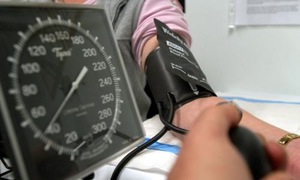
Medical groups have cautiously welcomed the overhaul of the Medicare rebate system announced on Wednesday morning, but have warned against making the review a “hitlist of savings”.
The health minister, Sussan Ley, announced an audit of all tests, treatments and procedures that fall under the Medicare benefits system (MBS) to make sure the government is getting value for money.
The review will try to identify any over-testing, outdated procedures and unnecessary referrals that cost money with little benefit to patients.
“The key thing is that the MBS, which has some 5,500 items, there’s only about 10% of them that have ever been reviewed and removed,” Ley said on Wednesday.
The health minister denies the audit is designed to pump money into the budget, after public criticism prompted the government to back down on a number of previously proposed savings measures, including the controversial GP co-payment.
“There’s no billion-dollar savings target attached to this. There’s no figure that I have to come up with,” Ley said. “This is clinician-led, this is led by doctors.”
As part of the overhaul, the government will create an MBS taskforce and a primary health advisory group, which will examine a new payment structure for doctors treating patients with chronic illness.
The head of the Royal Australian College of General Practitioners, Frank Jones, said the formation of the expert groups was “fabulous”.
“The minister needs to be congratulated for listening to doctors and patients,” he said, noting the groups had been asked to report back by the end of the year.
Ley will also review the pause on the indexation of Medicare rebates, which is due to expire in 2018, saying the structural reform possibilities offered by the MBS audit would help.
“I wouldn’t like that pause to be there a day longer than it needs to be, and I recognise that, essentially, what it’s doing is freezing an inefficient MBS structure,” Ley said. “As soon as we can, and in consultation with doctors, we will lift the rebate pause.”
Labor, which introduced the pause, wants the health minister to lift it immediately.
“If she wants to remove the freeze she could do that today,” the opposition health spokeswoman, Catherine King, told ABC radio.
Jones said doctors would be forced to pass on costs to patients until the freeze was removed.
Greens senator Richard Di Natale said the freeze effectively amounted to a co-payment.
“If the government is committed to dropping the co-payment it must also drop the freeze on Medicare payments, as it is nothing more than a co-payment by another name,” he said.
The president of the Australian Medical Association Brian Owler said savings could be found in the rebate system, but added the audit should be patient-focused and clinician-led.
“We’re not going to participate in a review that simply is about saving money,” Owler told ABC radio on Wednesday. “It’s not going to be a hitlist of savings, it’s not going to be something that just looks at taking money out of the system.”
Both Labor and the Greens want any savings recouped by the review to be put back into the healthcare system.
King said: “It is pretty clear so far the government has got no intention of doing that at all. It’s just going to bank the savings and not reinvest it back. It’s not a reform if those savings don’t get banked back into health.”
The opposition leader, Bill Shorten, acknowledged that savings could be made in the health portfolio, saying governments “must always look for efficiencies” and that “no system is immutable”.
